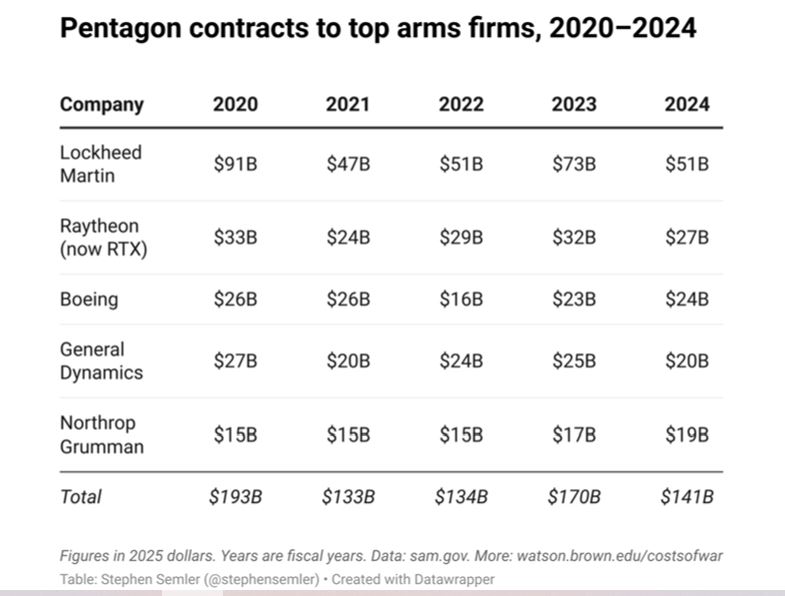Pentagon’s BIG FIVE Face Serious Challenge From Tech Giants As New Arms Race Brews In The U.S. For Lucrative Military Deals

A momentous shift is underway in the US defense market. Dominated by the big five for decades, a slew of new-age military tech firms are challenging the dominance of traditional defense manufacturers.
For years, the lucrative US defense market has been dominated by the big five: Lockheed Martin, RTX, Boeing, General Dynamics, and Northrop Grumman. They still account for an overwhelming portion of the Pentagon’s budget.
However, their dominance is no longer unchallenged. A bunch of new-age military tech firms in the fields of AI, autonomous vehicles, satellite connectivity, and communications are challenging the traditional dominance of the big five.
Leveraging emerging technologies, the rapidly changing nature of warfare, combined with traditional influence-building strategies such as financing election campaigns, bankrolling influential politicians, and funding think tanks, these new-age military tech firms —such as SpaceX, Anduril Industries, and Palantir —are breaking the glass ceiling of the US defense market.
However, these firms are not the only challenge facing the dominance of the Big Five. Traditional tech firms such as Microsoft, Google, and IBM are also eyeing a slice of the ever-expanding US military budget.
It’s a silent revolution that can change the face of the world’s most lucrative defense market.
The Dominance Of The Big Five
Over the last three decades, the US defense market has been dominated by private companies. Their share in the Pentagon’s defense spending budget has gradually increased.
A recent report from the Quincy Institute for Responsible Statecraft and Costs of War project at Brown University found that the share of private companies in the Pentagon’s defense spending has been gradually increasing.
“Over the past 35 years, the Pentagon has devoted an increasing share of its budget to private sector contracts. For fiscal years 1990–1999, the Pentagon’s average annual spending on contracts equaled 41% of its overall spending. This has increased over each passing decade,” the report said.
During the first five years of this decade, the share of private companies in the Pentagon’s budget has increased to a record 54 percent.
| Share of Private Companies In Pentagon Budget | |
| 1990-1999 | 41 % |
| 2000-2009 | 52 % |
| 2010-2019 | 53 % |
| 2020-2024 | 54 % |
For the period 2020-2024, out of the total defense spending of USD 4.4 trillion, private firms got USD 2.4 trillion in contracts.
However, an overwhelming majority of this share has been cornered by the big five.
Between 2020 and 2024, the top five Pentagon contractors received a total of US$771 billion in contract awards.
The US$771 billion obligated to the top five contractors represents one-third of the total US$2.4 trillion in Pentagon contract awards from 2020 to 2024. Lockheed Martin led the field by far with US$313 billion in contract awards from 2020 to 2024, US$168 billion more than its closest competitor, Raytheon (now RTX), which received US$145 billion in contracts.
The share of the top five contractors during this period is as follows:

However, this dominance is increasingly at risk from new-age military tech firms.
The Rise Of Military-Tech Firms
Even though the big five continue to corner a large share of the Pentagon’s defense spending budget, there has also been an upsurge in new contracts with tech firms that specialize in military applications of AI, including swarms of drones, uncrewed ships, and armored vehicles, as well as other emerging technologies.
The rise of these new military technology firms marks the biggest shift in the arms industry over the past five years.
“Companies like SpaceX, Palantir, and Anduril have been tapped for multi-billion-dollar contract awards from the Pentagon for communications, targeting, unpiloted vehicles, anti-drone defenses, and hypersonic weapons. The funds from these awards will flow to the companies over time, which should put them in the top ranks of Pentagon contractors by value of awards within the next several years,” the report from the Costs of War project said.
The report further notes that, despite receiving Pentagon contracts worth tens of billions of dollars, the initial awards resulting from these commitments were still in process as of 2024, and therefore, these firms were not among the top ranks of Pentagon contractors.
However, that “may change in the next several years.”
For instance, Anduril has received awards for countering Unmanned Aerial Vehicles (UAVs) from the Marines (US$642 million); a contract for its Roadrunner UAV interceptor system (US$250 million); and contracts for its Ghost Shark autonomous underwater vehicle as part of the U.S.-UK-Australia AUKUS project, to name a few.
Anduril has also been selected to build the next generation of Army goggles, the Integrated Visual Augmentation System (IVAS), which are “intended to give soldiers everything from night-vision capability to warnings of incoming airborne threats.”
Anduril is also competing to make “collaborative combat aircraft” – unpiloted systems designed to operate in conjunction with the F-35 and F-47.

However, Anduril’s most lucrative contract could be in border security technologies. The Big Beautiful bill commits over US$6 billion for various border security technologies. However, the conditions laid out in the bill mean that Anduril is the only firm that qualifies for these border surveillance tenders.
Similarly, Palantir has a US$618 million contract with the Army for a data platform that utilizes artificial intelligence; a US$480 million contract to continue work on the Project Maven targeting system; and a US$463 million, five-year contract with the U.S. Special Operations Command to help integrate advanced commercial software into its operations.
SpaceX is launching most of the US military satellites. It is also receiving funding for the military version of its Starlink system, best known for providing internet service to Ukrainian forces.
Separately, the Pentagon is also considering an investment in SpaceX’s Starship system.
“Based on the prospects for billions in new revenue from Starship and other technological developments, SpaceX’s revenues from the Pentagon are poised to grow dramatically in the next few years,” the report notes.
SpaceX and Anduril can also win contracts worth billions of dollars in the upcoming ‘Golden Dome’ project.

Established tech firms are also challenging the dominance of the Big Five. To give just one example, Amazon, Microsoft, Google, Oracle, and IBM are collectively investing US$10 billion in the Pentagon’s cloud computing program.
“To the extent that the Pentagon moves towards AI-driven weapons systems, including swarms of drones and uncrewed aircraft, ships, and combat vehicles, the dominance of the Big Five firms may be reduced,” the report added.
In fact, an essay published on the Anduril Industries blog, ‘Rebooting the Arsenal of Democracy,’ dismisses the Big Five defense contractors as the ‘remnants of the Cold War’ that need to be supplanted if America is to take the lead in developing and producing the weapons of the future.
“Why can’t the existing defense companies simply do better? The largest defense contractors are staffed with patriots who nevertheless do not have the software expertise or business model to build the technology we need.
“Tomorrow’s weapons – autonomous systems, cyberweapons and defenses, networked systems, and more – are enabled through software, while these companies specialize in hardware. These companies work slowly, while the best engineers relish working at speed… These companies built the tools that kept us safe in the past, but they are not the future of our defense,” the essay says.
It remains to be seen whether the Big Five are truly the remnants of the Cold War or whether they can adapt to changing warfare needs and continue to dominate the US defense market.
However, one thing is sure. New-age tech firms are also adept at replicating the influence-building strategies of the Big Five.
A Trick From The Old Playbook
The new-age tech firms are leveraging emerging technologies. However, at the same time, they are also adept at copying the traditional influence-building strategies of the Big Five.
SpaceX’s Elon Musk was one of the biggest donors to the Trump campaign in 2024, donating nearly US$277 million to support Donald Trump’s 2024 presidential campaign and other Republican candidates.
Subsequently, Musk joined the Trump team as the head of the Department of Government Efficiency (DOGE).
Although Musk has now fallen out of favor, during his tenure at DOGE, he repeatedly criticized Lockheed’s most lucrative military project, the F-35, calling it “the worst value for money” of any U.S. combat system.
Trae Stephens, Anduril’s co-founder and executive chairman, served on Trump’s transition team in 2016. Michael Obadal, Trump’s nominee for Under Secretary of the Army, worked at Anduril until June.
Anduril founder Palmer Luckey is also a longtime supporter of Trump and has hosted multiple fundraising events for the President.
“Emerging tech companies have outsized influence in the Trump administration, as evidenced by the role Elon Musk took as de facto head of the Department of Government Efficiency, vice president J.D. Vance’s close ties to Palantir founder Peter Thiel, and the role of Silicon Valley tech companies and the venture capital firms that invest in them in vetting candidates for the Pentagon and other key agencies and filling posts within the administration,” the report said.
“The military tech sector is deeply embedded in the Trump administration, which should give it an upper hand in the budget battles to come,” it added.
Furthermore, the emerging tech companies have taken the “revolving door” strategy, a policy by which former politicians are given lucrative positions in arms industry-linked venture capitalist firms, to new heights.
An investigation by Eric Lipton of The New York Times found that at least 50 former Pentagon officials transitioned to work for military-related venture capital or private equity firms between 2019 and 2023.
For instance, Vance worked for a venture capital firm owned by Palantir founder Peter Thiel, and his relationship with Thiel will give the military tech sector an open door to the White House.
A recent analysis by Bloomberg found that “more than a dozen people with ties to (Palantir founder Peter Thiel — including current and former employees of his companies) have been folded into the Trump administration.”
These figures show that even new-age military-tech firms can outperform the Big Five in their own game by financing and co-opting politically influential individuals.
The battle for the lucrative US defense market has entered a new phase where the dominant position of the Big Five is no longer safe.
- Questions and Answers
- Opinion
- Motivational and Inspiring Story
- Technology
- Live and Let live
- Focus
- Geopolitics
- Military-Arms/Equipment
- Seguridad
- Economy
- Beasts of Nations
- Machine Tools-The “Mother Industry”
- Art
- Causes
- Crafts
- Dance
- Drinks
- Film/Movie
- Fitness
- Food
- Juegos
- Gardening
- Health
- Home
- Literature
- Music
- Networking
- Other
- Party
- Religion
- Shopping
- Sports
- Theater
- Health and Wellness
- News
- Culture

